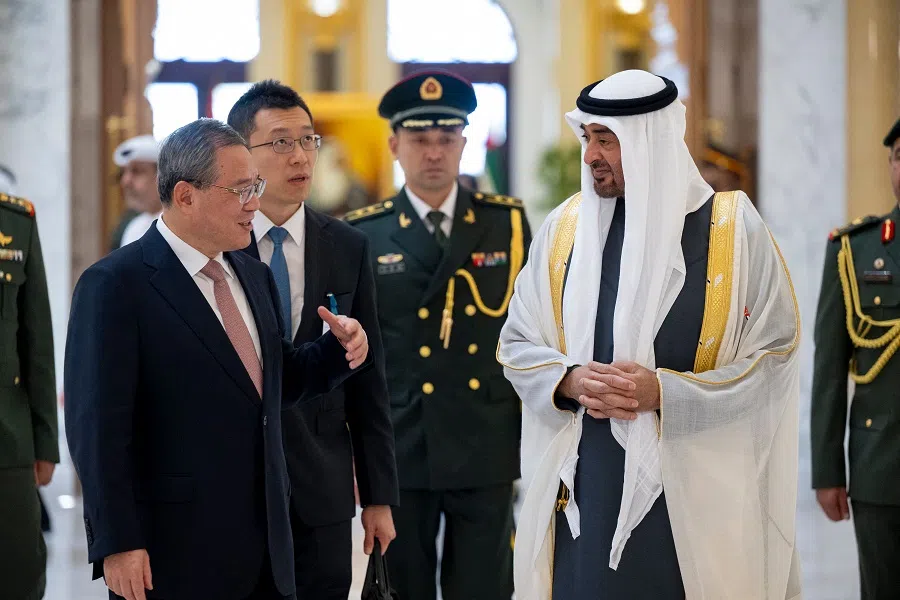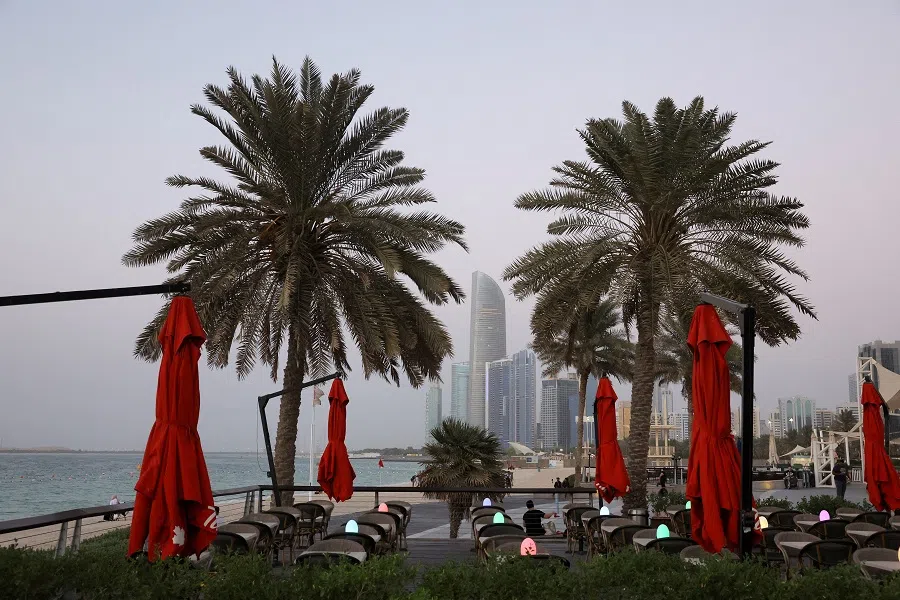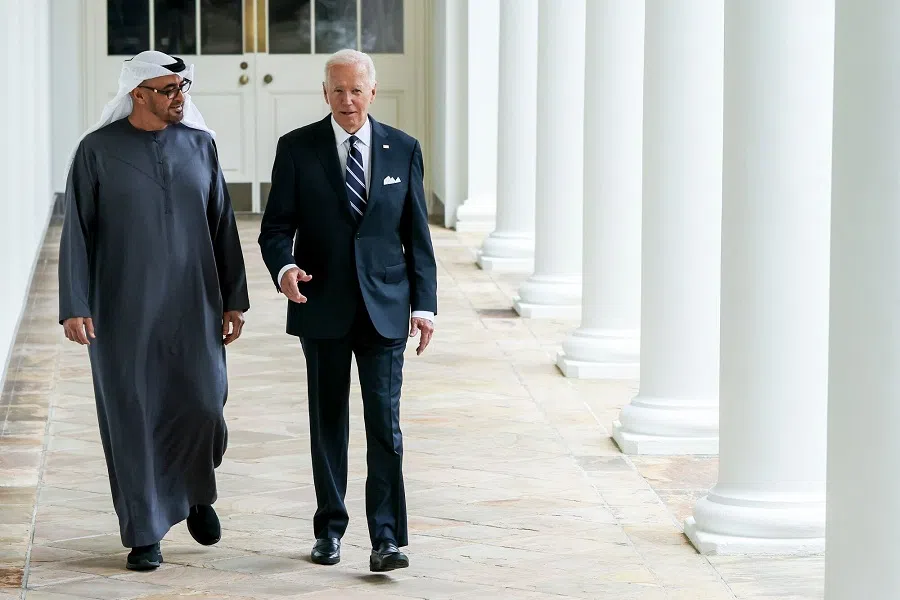Mutual interests: China-UAE ties strengthen amid Western pressure
UAE President Sheikh Mohammed bin Zayed Al Nahyan made an official visit to the US as president for the first time last month. Meanwhile, UAE-China relations are growing ever stronger, says academic Ghulam Ali.

On 1 November 1984, China and the United Arab Emirates (UAE) established diplomatic relations. China opened its embassy in Abu Dhabi in April 1985, and the UAE opened its embassy in Beijing in March 1987. Currently, the UAE has consulates in Hong Kong, Shanghai and Guangzhou and China has a consulate-general in Dubai. Over the past 40 years, the two countries have expanded their relationship in all fields.
High-level visits between both countries, which began early on, played an important role in the development of bilateral relations. Chinese President Yang Shangkun was the first Chinese head of state to visit the UAE in 1989. The following year, in 1990, the UAE’s founding father and first president, Sheikh Zayed bin Sultan Al Nahyan, visited China. This was the first visit by any leader from the Arab Gulf states to China.
Other significant visits that strengthened the relationship included President Xi Jinping’s trip to the UAE in 2018. On that occasion, both sides elevated their relationship to a “comprehensive strategic partnership” representing the highest level of diplomatic ties. Sheikh Mohammed bin Zayed Al Nahyan visited China several times as the crown prince of Abu Dhabi and again in May 2024 as the president of the UAE. Over the past 40 years, both sides signed nearly 150 bilateral agreements and memoranda of understanding.
During President Sheikh Mohammed’s May 2024 visit, he described China as his second home and Xi termed China-UAE relations as a model.
Common position on major issues
China and the UAE back each other’s core issues. The UAE has endorsed the “one China” policy, opposed any form of “Taiwan independence” and advocated for peaceful reunification. China offered indirect support to the UAE in its territorial dispute with Iran over the sovereignty of three strategically located islands in the Persian Gulf: Abu Musa, Lesser Tunb and Greater Tunb. The joint statement issued at the China-GCC summit during Xi’s visit to Saudi Arabia in 2022 emphasised a “peaceful solution” to the disputes.
China maintained this position on other occasions as well, such as in the China-UAE statement after the China-Arab States Cooperation Forum earlier this year, provoking irritation from Iran. China has no direct stakes in the dispute and adopts this difficult position ostensibly to please GCC countries, which support the UAE’s efforts for a peaceful settlement. Iran, on the other hand, asserts that these islands are an integral part of its territory.

The China-UAE relationship is also expanding into the defence sector. In August 2023, both sides held the first-ever joint air exercise, “Falcon Shield”. They held the second series in July 2024 in China, indicating it is becoming a regular feature. The UAE purchased the L-15, a light attack multirole aircraft, from China. In the context of the UAE’s dispute over the purchase of 50 F-35 jets from the US, it has shown interest in buying China’s J-20 stealth fighter.
Diplomatic niceties, symbolic gestures, and rhetoric are important aspects of this relationship. During President Xi’s visit in 2018, Abu Dhabi welcomed him with a 21-gun salute, arranged a state banquet, displayed Xi’s image on an LED screen nearly the full height of the 65-story Adnoc Headquarters, renamed a mobile network “WelcomePresChina”, and bestowed upon him the “Order of Zayed”, the UAE’s highest civil decoration.
During President Sheikh Mohammed’s May 2024 visit, he described China as his second home and Xi termed China-UAE relations as a model. In the past two years, the UAE celebrated the Chinese Lunar New Year and this year’s Mid-Autumn Festival by illuminating the Burj Khalifa, the world’s tallest building in Dubai.
Since the UAE launched its Chinese language programme in 2019, over 71,000 students across 171 schools have enrolled in it.
Cultural ties and people-to-people exchanges are also on the rise. Well over a million Chinese tourists visited the UAE in 2023. Currently, more than 350,000 Chinese residents live in the UAE. More than 210 monthly flights operated by UAE national airlines connect the two countries. In response to the increasing demand, both sides are expanding the number of flights. Chinese culture and language are receiving attention in the UAE. Since the UAE launched its Chinese language programme in 2019, over 71,000 students across 171 schools have enrolled in it.
Closer through China-led groupings and trade
The UAE is gradually coming under China-led multilateral institutions. It joined the BRI in 2015 and became one of the founding members of the Asian Infrastructure Investment Bank. In May 2023, the UAE became a dialogue partner of the Shanghai Cooperation Organisation (SCO) and, in 2024, became a full member of the BRICS group, which includes Brazil, Russia, India, China and South Africa.
China and the UAE are also connected through the China-Arab States Summit and the China-GCC Summit. China invited the UAE as a “special partner country” at the 21st China-ASEAN Expo held in September 2024 in Nanning, China. This was the first time a GCC delegation attended the event.

The growth of bilateral relations can be measured by trade, which reached about US$95 billion in 2023. Notably, of this amount, the volume of non-oil trade was US$80.6 billion, reflecting a 12% increase compared to the previous year. This represents an 800-fold increase since the establishment of diplomatic ties. The two countries aim to increase trade to US$200 billion by 2030. From 2003 to 2022, the UAE made US$11.4 billion in investments in China, while China invested US$6.9 billion during the same period.
China-UAE relations have expanded to encompass all conceivable areas. Both countries have signed currency swap agreements, financial and digital cooperation agreements, joint investment deals, stock exchange partnerships, tourism initiatives, new economy collaborations, entrepreneurship programmes, aviation agreements, logistics partnerships, collaborations in AI and emerging technologies, and infrastructure projects such as digital networks, ports and construction.
China, faced with US and Western tariffs, sanctions and denial of technology, is drawn to the UAE, which offers a favourable investment environment and serves as a leading financial hub in the Middle East. It is no wonder that 60% of China’s trade in the region transits through the UAE.
Complementarities amid US intervention
The mutuality of interests in the changing global power dynamics brings both sides closer together. China, faced with US and Western tariffs, sanctions and denial of technology, is drawn to the UAE, which offers a favourable investment environment and serves as a leading financial hub in the Middle East. It is no wonder that 60% of China’s trade in the region transits through the UAE.
China’s vast market, economic clout, willingness to transfer technology, and no-strings-attached policy on one hand, and its expertise in renewable energy, infrastructure and scientific research on the other, complement the UAE’s economic diversification. Moreover, the nature of the regimes in both countries ensures political stability and policy consistency, while non-interference further supports the development of the relationship.

What can threaten this relationship? The US has remained the foremost strategic partner of the UAE throughout history. As the US noticed China’s deepening footprint in the UAE, particularly in the AI and defence sectors, it took measures to curtail this influence. At the US’s intervention, the UAE’s state-owned G42 divested from China and signed a hefty US$1.5 billion deal with Microsoft in April this year.
During UAE President Sheikh Mohammed’s visit to the US in September 2024, the US took further steps to entice the UAE. The US designated the UAE as a “major defence partner”, a status that would enhance military cooperation, interoperability, and advanced weapons transfers, and could revive negotiations for the F-35. The two countries also announced a partnership to lead global advancements in artificial intelligence (AI).
While some analysts suggested these developments would curb China’s role, a Foreign Affairs article argues it would have little effect, as private companies from both sides would continue to cooperate — in the case of the G42, know-how could still flow to firms in the UAE with deeper links with Chinese investors.
Whether the UAE will choose a side — less likely given the rising multipolarity and relative decline in US power — or maintain a balanced relationship with both powers, as is the case for most Arab Gulf states, will be observed as it celebrates its 40th anniversary of diplomatic ties with China.





